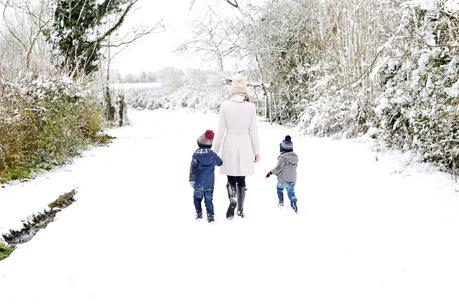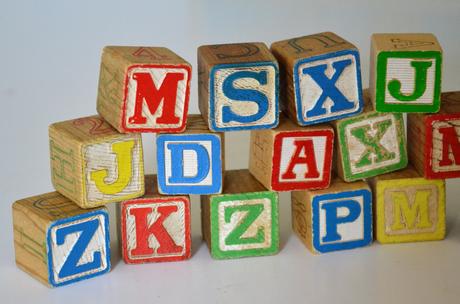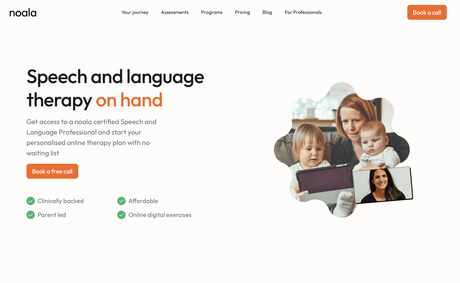
A few weeks ago I was contacted by Speech and Language Professionals Noala, who asked if I would be interested in collaborating with them to raise awareness of speech and language therapy for children and as a Mum who had a toddler with a speech delay I was really interested in hearing more about what they do and the advice they share for parents with toddlers and children who have a speech delay. Even though I'm a firm believer in children developing at their own stages and all differently, I do know first hand the worry and anxiety that, especially as a first time Mum, can accompany not knowing exactly what to do when your child has a delay with speech.
Below is a post I am sharing that was written by the speech and language professionals at Noala - it has some great bits of advice and some really useful tips about how as parents we can help develop our child's speech and language development through play, as well as information about the help and support that Noala themselves can offer too.
The importance of tracking your child’s speech and language development:
Your child’s development, especially within their first five years of life, is essential. During these five years, your child’s neurological development should progress rapidly. Researchers and clinicians agree that positive interactions between the caregiver, the child and the environment are crucial for support.
So why is it important to track your child’s speech and language development? Children with good communication, language and literacy level at a young age have shown to have the “highest correlation with outcomes in school at seven years”. When your child faces communication difficulties during their early years of development, both their learning ability and access to the curriculum may be negatively impacted. Children who aren’t able to communicate their needs may also have behavioural difficulties, such as presenting frustration and tantrums. “81% of children with emotional and behavioural disorders have significant unidentified communication needs” shares the RCSLT Organisation
When can you start tracking your child’s speech and language development?
From the moment your child is born, their communication starts. Day by day, we can track both nonverbal and verbal milestones. In your baby’s early stages you may come across their first babble and smile, coo and cry, or even their sweetest first laugh. These are all good indications for you to know that their communication skills are developing.

Your baby’s first year of life
During the first 12 months, you can closely track signs for “typical” development. Some signs will be more noticeable than others. Being aware is very important so that you can report back to your paediatrician and make informed decisions.
By 12 months, your baby should be producing sounds, like mama and dada. Or even start imitating sounds you make, like oh uh or wow. Taking note that they’ll be using these words more consistently with intent. Your baby can start communicating through movement. Start to point to things or wave when saying hello or goodbye to them. Lastly, listening to you and acknowledging what you’re saying. Like understanding what no means, or when you give them a simple instruction such as come here. This is an early milestone to track for receptive language (understanding of language).
Every child is on their own unique journey. Communication milestones are what 75% of children achieve at these identifiable ages. Some may start developing earlier, where other children may be slightly late. Within these early years, it is important to have an updated audiological assessment or hearing screening to determine if there may be an audiological impairment. If there is, your child’s communication milestones may be impacted.
Many families have felt that their pandemic babies' speech and language development has been impacted over the past few years. There is a lot of clinical evidence and clinicians addressing the impact of the pandemic. Here is one of our families speaking about the effect of the pandemic on her children’s development.
“While the world may be trying its best to move on from the coronavirus pandemic, there is no doubt that the impact is still being felt in many ways. My son turned 1 shortly before the United Kingdom went into its first lockdown. My middle daughter was at nursery and my eldest was in year 3. Overnight our world shrank. Instead of going to baby groups, nursery or even meeting up with friends, we were at home every day. At 1 and 4, my younger children were both at key ages for learning basic skills, like talking, communicating and socialising. My son’s mobility was impacted due to staying at home. His ability to run, jump and stamina for walking were all significantly behind his sister’s at the same age”
For many families in our community, similar feelings of isolation and experiences occurred. As a caregiver, you have the opportunity to provide your children with more face to face time at home, especially when services and people weren’t allowed around your family.
Tracking your child’s communication development can be beneficial. Let’s explore why and how you can play an important role in fostering your child’s communication skills.
The role you play in your child’s communication development
No one knows your child better than you do.
You’re able to offer more individual attention.
You’re able to create learning opportunities during your daily routine. Mealtime, grocery shopping, bath time and bedtime are all great moments to leverage.
You can encourage your child’s confidence, and motivate them through frequent praise.
You have the benefit of practicing skills outside a clinical setting and rather in familiar environments to your child.

5 easy ways you can foster speech and language development in play:
Creating opportunities during everyday activities is a vital part of you and your child’s interaction.
Social skills: Stay on topic, using appropriate body language when communicating needs and emotions, attending to you during play, and using both verbal and nonverbal communication. An activity can include using their favorite toy or object. Make sure you're sitting within eye level of your child and turning off any distractions, such as the television. Model turn taking to your child, and ask simple questions as you go along.
Expanding vocabulary: Through everyday activities you can model opportunities for your child to increase their spoken language. A great activity can be at mealtime. Your child is saying “red apple”. You can give your child sentence starters for more complete sentences. “I see a …” and your child may answer with “red apple. Then you can move onto, “I see a red apple, what do you see”. Offering them an opportunity to use a complete sentence, without telling them.
Following more complex instructions: You want to keep directives simple. Play is a perfect format for this. An activity can include baking in the kitchen. Tell your child, we’re going to bake bread. What do you need to bake bread? If they don’t know, you can tell them, we need flour, water, and salt. Let’s mix the ingredients. We can take it out of the oven. Let it cool. With this activity, we’re targeting vocabulary indirectly.
Attention and listening: Turn those televisions off. No distractions. During playtime, you want your child to attend to you. For example, you’re building a puzzle. Make sure you’re giving your child all the steps so that they can transition from one step to another seamlessly, without having to get up and find other pieces. The goal would be to increase the duration of their attention to an activity. Starter with smaller durations and build it up.
Speech sounds: You want to work on the /b/ sound with your child. Model the sound to them with your mouth, showing them how to move their lips, jaw and tongue. An activity that could follow is a classic, like Mr Potato Head. Talk about what your tongue, teeth and lips are doing when you are making the targets sound. Practice making the sounds together in the mirror. Try to repeat back the word they have said, emphasizing the correct sound

At noala, we’re on a mission to make speech and language therapy mainstream. Our platform offers online speech therapy, thanks to parent-led therapy plans. After setting up a baseline during an assessment, families are able to access their personalised program. These programs include interactive clinically-backed digital exercises and coaching videos from our Clinical Director.
Our first program Communication Boost focuses on fostering children’s first words and sentences. Did you know that 2 to 3 kids per class have a developmental language disorder? This Speech and Language Communication Needs (SLCN) is unfortunately still under-diagnosed.
Our program is a 6 week therapy plan, building from following simple language tasks to more complex, across 3 different levels. We currently support children aged 1-7 during their communication journey. Each child works at their own pace. Families are excited for the next sessions, as they are able to have engaging play times with their children, as well as improve speech and language development.
Our speech and language professionals guide you every step of the way, with weekly coaching calls for support. A mother shared about her daughter's progress in our program, “I have seen some good progress in her speech language and communication.”.

